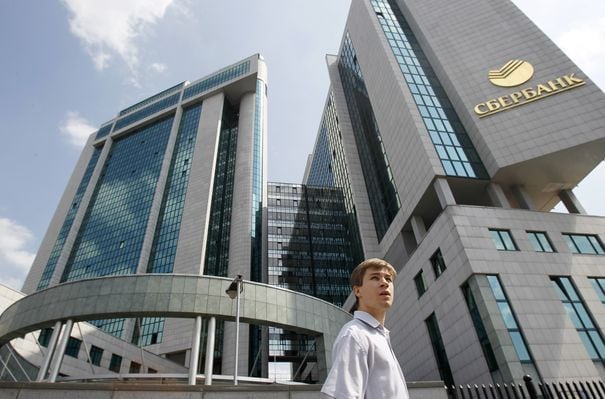February 24, 2022. Russian troops are on the borders of Crimea. 3:48 a.m. Vladimir Putin announces the start of a military operation. The green light is given. The tanks of the Kremlin army invade Ukraine. More than two and a half years later, Volodymyr Zelensky’s country is fighting to regain these lands occupied by the invader. Russia, for its part, is seeking to extend its influence over what Moscow calls “its territories”. Relentlessly. And in this strategy of “Russification”, a crucial step: the opening of branches of Russian state banks in occupied Ukrainian cities.
Half a dozen offices in Mariupol
Last January, Vladimir Putin set the tone. “You must start going to these territories with more enthusiasm and working there,” he declared, addressing the leaders of the Russian financial sector. A call heeded by Sberbank and Vneshtorgbank (VTB), the two largest state banks in the country. According to information from the Financial TimesSberbank has reportedly opened 130 ATMs and 48 locations in eastern and southern Ukraine, including full-service branches. “We will be able to provide assistance in registering businesses, opening bank accounts […] and we will also provide cash settlement services,” the deputy chairman of the board of Sberbank assured in an interview with the Rossiya 24 TV channel. In total, nearly 70,000 people have already benefited from the bank’s activities. Among the cities concerned by these services: Mariupol, which, since its conquest by the Russians in 2022, has housed half a dozen “mobile offices” of Sberbank.
The second bank involved, VTB, has also announced that it will also start receiving clients in the occupied port city by the end of the year. In July, its director, Andrei Kostin, was photographed cutting the ribbon of a first branch in Luhansk. “This is not just a new office. This is another important step in the process of integrating the region into the country’s economy,” he said on the occasion.
If the director of the second largest Russian bank insists so much on the importance of this installation, it is because this action is fully part of a strategy of “Russification”. After the changes to Ukrainian school textbooks and the removal of historical monuments, the arrival of banks of such magnitude allows Vladimir Putin to display Russian patriotism in territories that he wishes to definitively appropriate. Banks are not the only ones contributing to this objective. The Black Star Burger restaurant chain, owned by pro-Kremlin rapper Timati, announced in June that it would open establishments in Mariupol, as well as in the Kherson region.
80% of Russian banking system sanctioned
However, companies operating in occupied areas are openly exposed to Western sanctions. This is why many of them did not respond to the Russian president’s call last January. In March 2022, seven Russian banks, including VTB, were subject to the first sanctions from the European Union: all were ousted from the international financial system Swift. A radical decision intended to paralyze Russian commercial activity and complicate the international business of the clients of the banks concerned. Three months later, Sberbank was added to the list after yet another sanction decided by the 27. Even if Vladimir Putin likes to claim that public companies “have nothing to fear” by setting up in the occupied regions, everything seems to show the opposite. In 2022, around 80% of the Russian banking system was targeted by EU financial sanctions.
Apart from the reprisals of the 27, the profits made in these regions do not seem to be a strong argument in the eyes of professionals. “Reasonable companies will not go there […]”The purchasing power is low since most of the remaining population in these areas are retirees and civil servants. The risks are high,” he explained to Financial Times a person working in the Russian retail sector. Despite the danger, the gain seems much more attractive for many firms. In 2023, according to the data of the Russian tax service, more than 2,500 companies were registered in the “new regions”.
